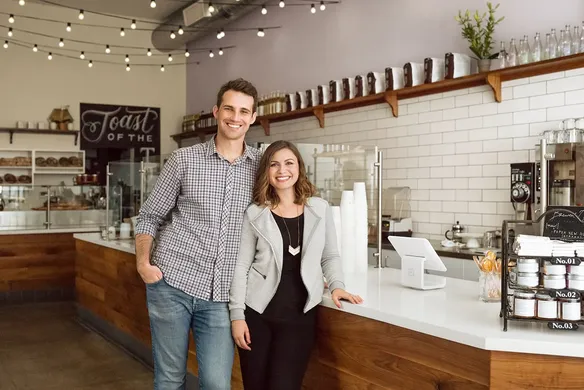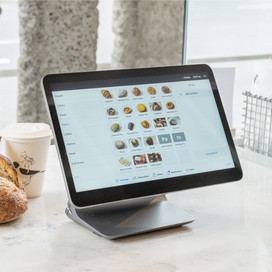Table of contents
Your clear vision of a swanky coffee shop tucked into a quiet neighbourhood could be getting a little foggy as you start looking for a business location. While shopping around for a location sounds easy (and even fun), finding the best location for a coffee shop can quickly become frustrating due to limited availability, high rent prices and lousy landlords.
Don’t let some of these challenges hinder your location hunt. To find the right business location, you have to think beyond rent prices and physical space. Here are the top five things to consider when selecting a coffee location:
1. Demographics
Foot traffic is important when you’re picking a location for your coffee shop. But a tonne of foot traffic doesn’t matter if those people aren’t your target demographic.
Understanding your target market is a crucial step when you’re starting a coffee shop and it should largely influence your location decision. Where is your customer going when they pass your coffee shop and make the decision to purchase your coffee? They could be on their way to work, school, university, or potentially on their way home after dinner. Dissecting your customer helps you better determine the best location for your coffee shop.
For example, if you’re targeting employees on their way to work, opening your coffee shop in a family-friendly shopping centre might cause your business to struggle in sales even if the location generates a lot of foot traffic. You’d be better off opening in an area close to an office park or in a business district.
2. Neighbouring businesses
When you’re determining the best location for a coffee shop, neighbouring businesses can also affect your profitability — both negatively and positively.
It might be obvious to research other local coffee shops to find out where they are established, but your competitors aren’t limited to other coffee shops. If your coffee shop targets customers looking for a quick breakfast, you should keep your eye on quick breakfast alternatives including smoothie joints, juice bars, bagel places and even fast-food chains. While these businesses are all in different categories, they could all be competing with the products you serve.
Neighbouring businesses can also help your coffee shop by complementing your offerings. If your coffee shop has a large empty space, it might be smart to open near other businesses or a university so you can transform the space into a study space. This provides an ideal area for employees or students to come in and get work done before or after hours. If you’re targeting customers who seek a midday caffeine buzz, you may want to look at shopping centres where customers need a pick-me-up while walking around and shopping.
3. Accessibility
The accessibility of the space should be another consideration when you’re searching for the best location for your coffee shop. While your customers will come back for the quality of your product, the convenience of your coffee shop’s location will also weigh into their decision to first give you a try (and then come back).
Think back to your target consumer and how they will get to your location. If they’re driving, it’s incredibly important to provide parking. For coffee shops that target customers walking to or from another destination, street visibility might be more important.
Remember, if your store isn’t easily accessible, you’ll often lose your customers to the competition.
4. Building infrastructure
Coffee shops require a unique building infrastructure that not all commercial spaces can accommodate. Ideally, you’re looking for a cosy space that fits an optimal amount of customers without feeling overcrowded. You also need room to set up your coffee shop equipment comfortably, so baristas have sufficient space to move around.
In addition to the actual space, some commercial spaces don’t allow food permits or alcohol licences on their property. Make sure you inquire about this information when you’re scouting locations for your coffee shop, and consider engaging a legal or business expert to determine what permits or licences you may need.
5. Terms of the lease
It’s the most obvious question that comes to mind when you’re searching for the right business location: can you afford it? And more importantly, can your customers afford it?
If you select a coffee shop location with high rent, that cost will be reflected in your coffee prices. While that’s not a bad thing, you have to keep in mind your target customer.
You also need to determine if a location requires any renovations. Small business loans can be used to help finance building costs if you feel financially strained. Because it’s a big decision, most people worry about taking a business loan. When analysing loan offers, there are a few things to check out, including the total payback amount, ease of payback and the lender’s reputation.
Aside from the cost of your building, there are various lease terms to be aware of that can help you determine the best location for a coffee shop. Some of these include:
- Length of the lease. Commercial leases are legally binding contracts, and you generally cannot easily break or change the terms. Make sure you talk to a lawyer before signing any agreements.
- Allowable rent increases. Check to see if the landlord is allowed to increase your rent after a lease is signed.
- Insurance requirements. Some leases require specific insurance coverages that increase your overall costs.
- Security deposit and conditions for its return. It’s important to know how much you have to pay upfront and the process of receiving that deposit back.
- Maintenance and repair terms. Find out who is responsible for the maintenance of the space and who pays for this (you or the landlord).
This guide is for educational purposes only and does not constitute legal advice. Please consult a legal expert to address your specific needs.
![]()











